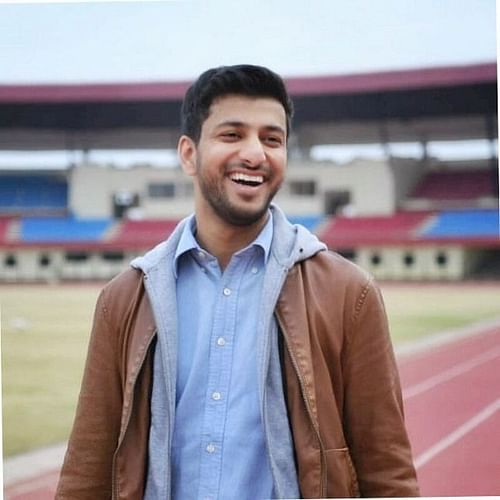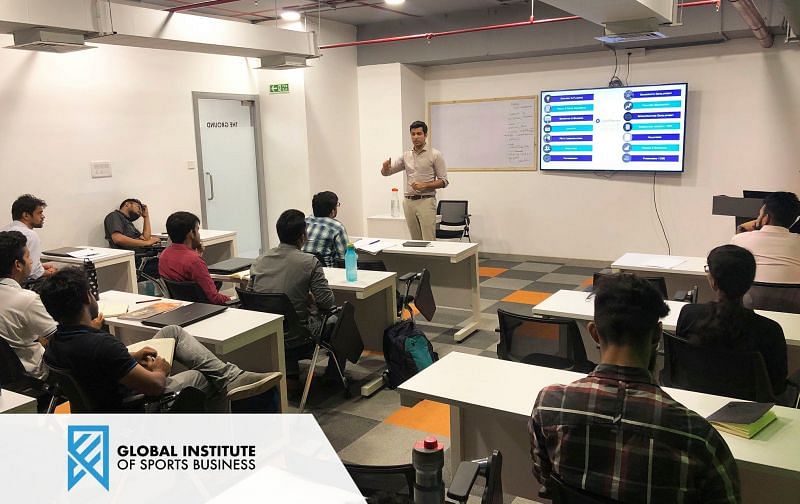
Around the world: A journey through countries for the love of sports

Arjun Singh's passion for sports started when he was very young. He shifted his interest in playing games to the business world of sports after realising that he was a better fit for the latter. He traveled across three countries on three different continents to gain better exposure to the sports business industry and also completed the Master's in Sports Management from Columbia University in the City of New York.
He currently serves as a manager for the sports sector at the prestigious firm Grant Thornton LLP. In this interview, we get to know more about him and also get his advice about how to approach a career in sports management and business.
#1. Let's talk about your early career. How did you get into management consulting? What made you take the leap into sports consulting?
I’ve always been extremely passionate about sports. So even though I wanted to kick off my career in sports from day one, that wasn’t the case. When I was 20 and looking for my first job, I took the first break that came my way, and no it wasn’t in sports, it was sales for an Auto company!
Back in 2008-09, you can imagine the limited opportunities in sports management in India. So, while working in sales got me to learn some unique skills, I always wanted to be a part of the sports world, couldn’t imagine life without it. It was in 2011 that my first offer for management consulting came, and it just so happened that my supervising manager at that time was responsible for the sports advisory practice at EY. Call it fate, destiny or pure luck, he gave me a good platform to help him out on sports consulting assignments, and that’s when I realized that this was the ONLY industry I want to build my career in.
#2. How did you go about making yourself more acquainted with the sports business industry?
I always did keep up with sports news as an interest, but that was more towards current affairs on global competitions or famous sportspersons. Gaining knowledge on Sports Business was something that I began only after realizing the gap in knowledge between the veterans in the industry and myself. So, I started reading regularly on sports business and reached out to industry professionals proactively. Before I knew it, not only did my knowledge and understanding of the sector start to expand exponentially, I also realized that I loved it! Clearly, when we’re working in something we’re extremely passionate about, keeping up with industry trends becomes easier, it’s like a chosen lifestyle.
#3. You studied at Columbia University, the Indian School of Business (ISB), Oxford Brookes University and The Shri Ram School. Thus, you have got the experience of studying and living in India and abroad. Can you talk on the impact of your education on your sports business acumen?
In today’s era, the value of a good education is essential for getting jobs, etc. Contrary to what some may say, my experience showed me that education is not just a degree, a piece of paper, or something to write on your CV – it’s the entire experience that forms who we are, and that’s what sticks in a successful and sustainable career. So when we talk about the impact of education on my career, I’d say if it wasn’t for the education I received, I wouldn’t even be close to where I am.
In terms of my diverse educational background, I would say the first and last were my key value additions. Firstly, my schooling (Shri Ram School) was not like any other school - it gave me the foundation that pushed me to follow my passion, which is not that common in the Indian educational system. And finally, Columbia University, where I cemented sports management as my forte – the entire international experience, network, connections, faculty, and learnings are something that have helped shape my sports management career today, and yes, the confidence one gets from completing an Ivy League program is the icing on the cake.
#4. You worked in sports in the USA for a bit. Can you share your thoughts on the difference between sports industry in USA and in India?
There’s no doubt that the US sports industry is way ahead at the moment, it’s more of a mature market. For example, even high school sports are a commercial product, televised with high school athletes famous in their respective states. College level sports are on another level – NCAA has created a system where college athletes are not just national superstars, but a viable example for youth who want to take up sports as a career. In business terms, the 4 major leagues in the US are in the top 10 most profitable sports leagues in the world.
As you can imagine, in India, we are far behind as an overall industry. Cricket and IPL being an outlier, our overall sports industry has a long way to go. In terms of business, our sports industry is extremely scattered and disorganized.
While many exciting initiatives are being taken, there are one-to-many duplicities of efforts as well as highly skewed investments. A significant portion of our stadia and facilities are lying as white elephants and the mind-sets of the majority of population still sees sports as an extra-curricular activity. Our overall sports industry does need more structure and oversight, but it's easier said than done. Having said that, our sports industry is slowly taking shape with increasing investments in it. With more professional services coming into play, we should eventually see at least some of these investments materialize into tangible benefits.
#5. Now, you're managing the sports advisory division at Grant Thornton India, can you please talk about how this started and what your role intakes?
I joined Grant Thornton India (GT) back in 2017, where the partner whom I work with had a vision to professionalize advisory services in the Indian sports industry. And of course, having a similar mind-set, we ventured into working with state governments on getting best practices implemented at the grassroots level. Starting from scratch, within 3 years, we built a solid base for our brand that is recognized as the best sports services consulting firm in India.
My role is to lead the sports advisory vertical of the firm. This primarily involves generating new business, managing existing clients and of course, the backbone of it all, hiring and managing the people. Our clientele is mainly public sector, i.e. state governments, where we advise and assist the bureaucrats in planning and implementing sports strategies for events and grassroots development.
Our hallmark project has been being the advisor to the Odisha Government for all sports events and programs in the state. Today, Odisha is regarded as India’s leading destination for sports events. On a personal note, successfully managing the 2018 Hockey Men’s World Cup in Bhubaneswar has been a special milestone and achievement.

#6. What do you think needs to be improved in the current system in place for sports in India? Where do you see sports business in India in the future?
As I mentioned earlier, we need investments and resources in many aspects but let’s focus on some key issues to address. Maybe we should start with what most of the industry talk has been - improving our sports infrastructure. While many new facilities keep coming up, the lack of planning around it is astonishing.
There are so many sports facilities in India which have extremely low, if any, utilization post an event. Our facility owners are moving towards public-private partnerships to help address this, but clearly the model requires more hand-holding if it is to be effective. So, before investing in creating new facilities, we might want to focus on making the best use of our current facilities.
Another need of the hour is an overarching umbrella for the Indian sports industry, something on the lines of what NASSCOM has achieved with IT. I see so many amazing initiatives being taken up in all corners of our country, it would be great if there could be a regulatory body set up at the ministry level, to put everyone under one umbrella. This will help synergise a lot of our efforts.
The Indian sports industry is slowly taking shape, and with the growth of participation, investments, government incentives and a gradual cultural mind-set shift, we should see an increase in sports as a business, and as an overall industry.
#7. What are your own personal goals for the next few years?
I’m already in a role I thoroughly enjoy, so I’m fully invested in enhancing GT’s position as the leading sports consulting service in India. Personally, of course I see myself growing year-on-year within the firm to hopefully one day be the first partner dedicated to sports advisory.
#8. What advice would you give to other youngsters who look into entering the sports business industry?
While at first glance, people think this line is all fun & games, but it's honestly quite the opposite. It takes blood, sweat, tears and sleepless nights to make a career in this field. There is enough competition out there, so go beyond the call of duty, identify your strengths and skill yourself with abilities that will make you stand out. Most importantly, I’d say put passion and hard work first, the rest (money and success) will eventually follow.